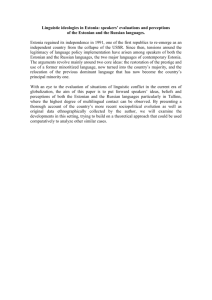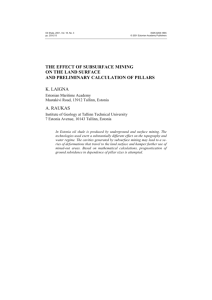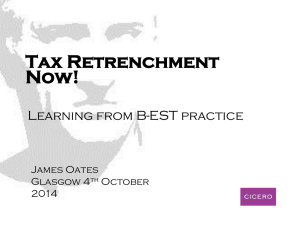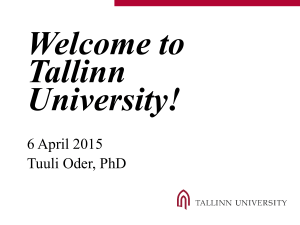UNITED NATIONS CONFERENCE ON TRADE AND DEVELOPMENT 21 April 2016, Geneva
advertisement
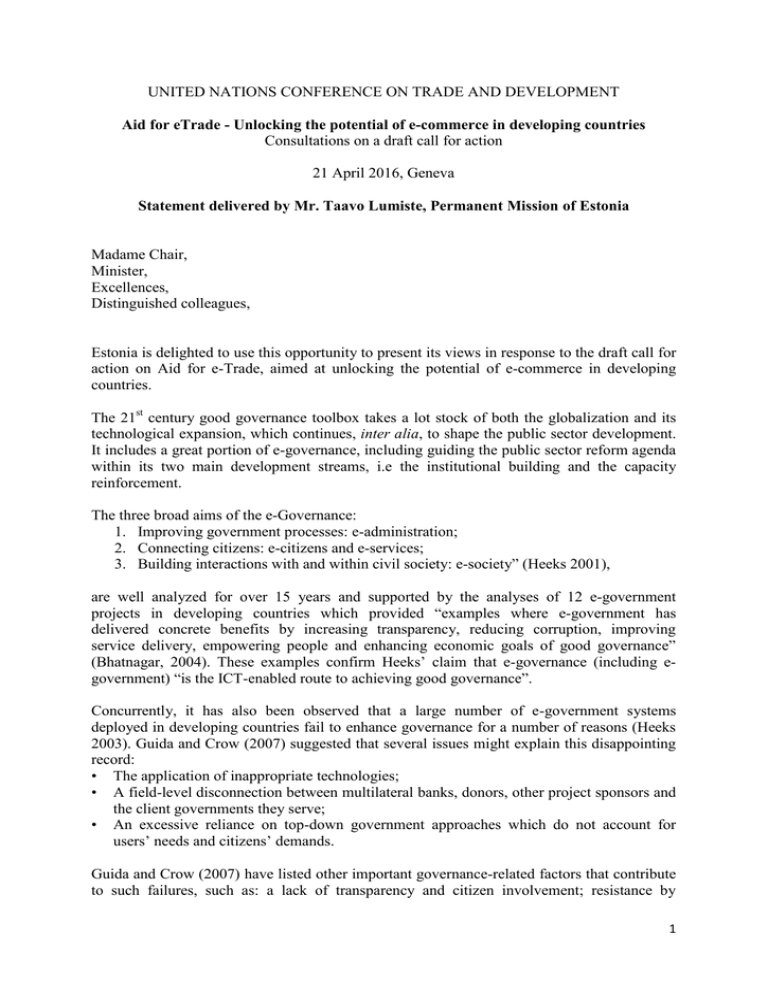
UNITED NATIONS CONFERENCE ON TRADE AND DEVELOPMENT Aid for eTrade - Unlocking the potential of e-commerce in developing countries Consultations on a draft call for action 21 April 2016, Geneva Statement delivered by Mr. Taavo Lumiste, Permanent Mission of Estonia Madame Chair, Minister, Excellences, Distinguished colleagues, Estonia is delighted to use this opportunity to present its views in response to the draft call for action on Aid for e-Trade, aimed at unlocking the potential of e-commerce in developing countries. The 21st century good governance toolbox takes a lot stock of both the globalization and its technological expansion, which continues, inter alia, to shape the public sector development. It includes a great portion of e-governance, including guiding the public sector reform agenda within its two main development streams, i.e the institutional building and the capacity reinforcement. The three broad aims of the e-Governance: 1. Improving government processes: e-administration; 2. Connecting citizens: e-citizens and e-services; 3. Building interactions with and within civil society: e-society” (Heeks 2001), are well analyzed for over 15 years and supported by the analyses of 12 e-government projects in developing countries which provided “examples where e-government has delivered concrete benefits by increasing transparency, reducing corruption, improving service delivery, empowering people and enhancing economic goals of good governance” (Bhatnagar, 2004). These examples confirm Heeks’ claim that e-governance (including egovernment) “is the ICT-enabled route to achieving good governance”. Concurrently, it has also been observed that a large number of e-government systems deployed in developing countries fail to enhance governance for a number of reasons (Heeks 2003). Guida and Crow (2007) suggested that several issues might explain this disappointing record: • The application of inappropriate technologies; • A field-level disconnection between multilateral banks, donors, other project sponsors and the client governments they serve; • An excessive reliance on top-down government approaches which do not account for users’ needs and citizens’ demands. Guida and Crow (2007) have listed other important governance-related factors that contribute to such failures, such as: a lack of transparency and citizen involvement; resistance by 1 entrenched bureaucracy; corruption; regressive policy and regulatory environments; and, unskilled human resources, which can be grouped together under the term e-readiness. From that acknowledgement I can say that the Aid for e-Trade initiative aligns with Estonia’s objective of expanding the use of ICT worldwide and of building a borderless digital society as the country takes the first steps in pioneering this vision with the e-Residency programme. Dear colleagues, Estonia is the first country to offer e-Residency – a transnational digital identity available to everyone in the world. By giving people – regardless of their nationality or place of residence – access to Estonia’s digital infrastructure and e-services, Estonia is building a borderless digital society and unleashing the potential of e-commerce and entrepreneurship around the world. After becoming an e-resident people can establish an EU company and administer it online, apply for an Estonian bank account and conduct e-banking, obtain access to international payment service providers, sign all relevant documents and contracts remotely, and enter the EU market more easily. This means that, for example, a woman in India can establish an Estonian company and administer it from the Philippines while serving clients in countries like Germany and India. As a programme that builds confidence and security in the use of ICT both by granting people a government issued digital identity and by allowing them to open an Estonian company and bank account online, e-Residency has far-reaching implications for economic growth and for the trade and development challenges faced by emerging economies. The use of a digital identity when transacting online will increase trust in the internet as a place to do business and manage personal data. Digital identities are increasingly becoming a foundational aspect of ecommerce and financial services in the digital economy. As such, they stand to further expand the digital divide faced by people from developing countries as they have to start from a position of disadvantage when compared to people who live in more digitised nations. EResidency, by being a government issued digital identity, can compensate for this drawback, fostering transparency and facilitating e-commerce growth. The advent of the digital age in international trade has opened new possibilities for countries at all stages of development. Digital trade can support the achievement of the United Nations Sustainable Development Goals (SDGs) and increase economic prosperity worldwide. However, many developing economies, and particularly least developed countries, often lack the digital infrastructure and legal and policy frameworks to enable their citizens to seize these opportunities. E-Residency is an option that businesses and entrepreneurs in developing countries can use to overcome deficiencies in domestic policy or infrastructure and better integrate themselves into global e-commerce. E-Residency is the product of years of development of Estonian e-government practices and its technological environment. As one of the most advanced digital societies in the world, Estonia is built on principles of decentralization, interconnectivity, transparency, security and trust. Today, Estonian citizens can vote online, establish a company online in less than 18 minutes, sign legally-binding contracts over the internet from anywhere in the world via a mobile phone, file tax returns online in less than five minutes, and have access to an ePrescription system and an electronic health registry, among others. Estonia’s technological development has resulted in an unprecedented level of transparency and accessibility in 2 government; a healthier, better educated population with easy access to social services; and a prosperous environment for business and entrepreneurship. Estonia’s support to create a more inclusive and development oriented information society is exemplified in its continuous collaborations with governments around the world. For example, Estonia’s expertise and support has extended to the governments of Namibia, Palestine and Azerbaijan, where Estonia has helped them establish a data exchange infrastructure similar to the one the Estonian government relies on, which will enable them to develop e-services for their residents and companies. Also, a very close cooperation on egovernance continues to develop with Finland, Norway, and the UK. Estonia is now opening its advanced technological environment and part of its e-services to the world via eResidency, with the vision of enabling the creation of an entrepreneurial society. As a result, e-Residency confers the ability to bypass infrastructural barriers that a person’s country of origin may impose on his or her capacity to become an entrepreneur and accrue economic grains for both themselves and their country. Therefore, a country’s immediate need to establish and maintain such a costly digital platform and regulatory framework will be greatly reduced if the Estonian one is used via e-Residency. However, e-Residency does not aim to create a tax haven in Estonia but to enable e-commerce online. E-Residency does not confer citizenship, tax residency, residence or right of entry to Estonia or to the European Union. Dear friends of Aid for e-Trade, To conclude, allow me to mention that the democratization in the digital realm enabled by eResidency aligns with the WSIS Action Lines and with many of the United Nations Sustainable Development Goals, especially SDG 8 (8a), with applications in e-government, ebusiness, e-employment, and international and regional cooperation. Estonia stands ready to contribute into the further exchanges on and development of this very important topic of Aid for e-Trade. Thank you. 3

